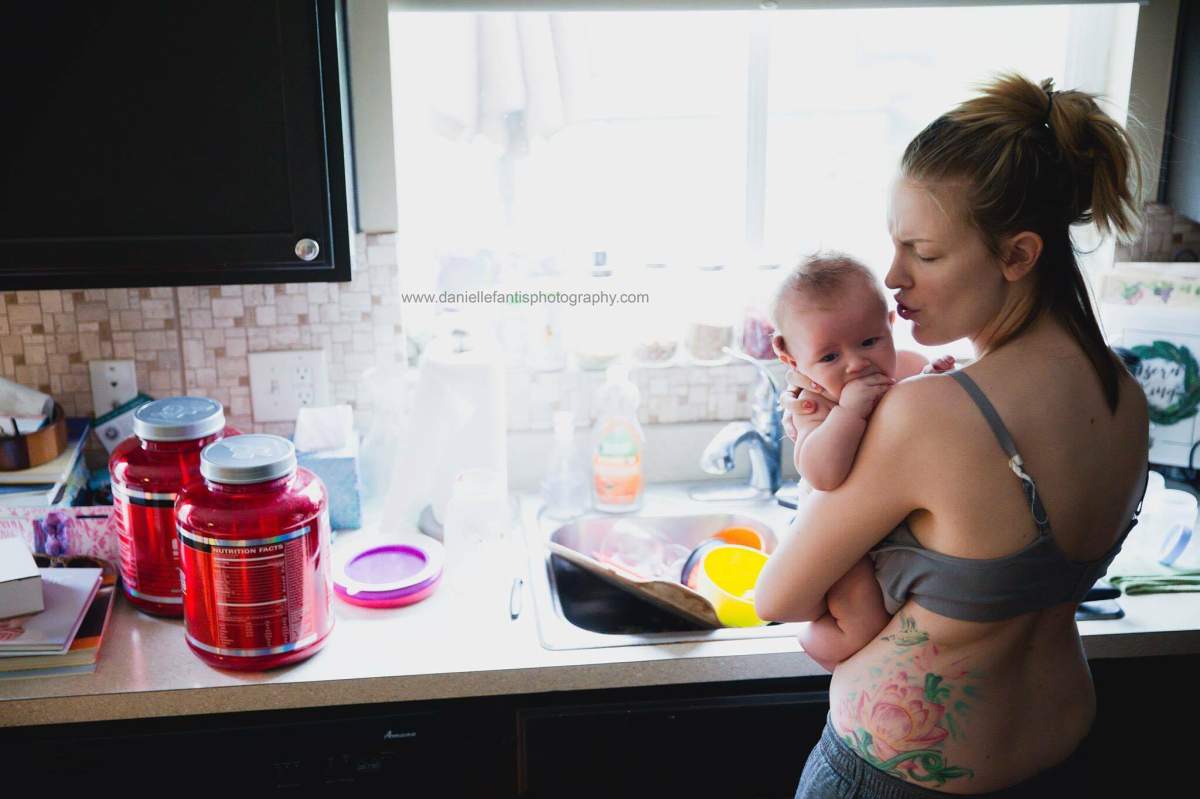It’s common to see photos of bubbly babies and happy families on social media, but any parent who lives with postpartum depression (PPD) knows the reality isn’t picture perfect.

In a Facebook post that has now gone viral, Cleveland-based mother, Kathy DiVincenzo, shares the reality of living with PPD in two distinct photos.
READ MORE: Mothers talk candidly about postpartum depression: ‘You’re not alone’
One shows the 27-year-old mom-of-two sitting in a messy room full of toys, wearing sweatpants and looking defeated. Another shows DiVincenzo with her hair and makeup done, a smile on her face, sitting in a tidy room.
“The truth is, both of these pictures represent my life depending on the day,” she writes. “I would only ever comfortably share one of these realities though and that’s the problem. The only thing more exhausting than having these conditions is pretending daily that I don’t.”
“This is so much more than just showing a messy playroom, this was meant to bring awareness to something that you simply can’t capture in an image: the physical, mental and emotional toll that mental illness can take,” she tells Global News.
- Health Canada recalls glucose monitors that may give ‘incorrect’ readings
- ‘Patients get relief’: Researchers recommending nerve blockers to treat migraines
- U.S. advisory panel rolls back universal hepatitis B vaccine recommendation
- Canada puts new restrictions on pistachios from Iran amid salmonella outbreak
“I think that type of honesty and vulnerability is what a lot of people can relate to, with or without a mental illness.”
DiVincenzo, who lives with PPD, anxiety and OCD, says this all started when she was venting to her friend and photographer Danielle Fantis about how frustrating it was to compare herself to other mothers on Facebook. After their conversation, Fantis took the series of photos that show DiVincenzo living day-to-day with PPD.
She says the stigma around maternal mental illness exists because new mothers are supposed to feel happy all the time.
“Society pressures us as new parents to appear to have it all together and be overwhelmed with joy, so when that’s not our reality it can definitely make others, and ourselves, pretty uncomfortable,” DiVincenzo says.

Get weekly health news
“The negative comments I’ve been receiving surrounding the post only further prove my point in posting it.”
Some commented on what she was wearing or how this could even be a form of depression.
May is Postpartum Depression Awareness Month, and DiVincenzo says the most important thing mothers dealing with PPD can do is to reach out for help.
“I know it’s the hardest step, but it’s the most important. You’re not alone in this and you don’t have to handle what you’re experiencing alone, either.”
What does postpartum depression feel like?
According to the Canadian Mental Health Association, although statistics show one in five women experience PPD, experts say it is far more common.
Symptoms include feeling sad, worthless, hopeless, guilty or anxious. Some may feel angry, irritable or unfocused when it comes to day-to-day tasks. In extreme cases, some mothers may have thoughts of hurting their child or themselves.
READ MORE: These 3 nutritional supplements can help combat the ‘baby blues’
Other mothers share their experiences
After DiVincenzo’s post went viral, many women shared their own stories on her Facebook page.

“Postpartum hit me 24 years ago. You can only imagine how horrified I was! The comments I received, from even the closest family members made me feel like a complete failure, however I was very lucky to find incredible doctors who actually understood my pain and treated me correctly,” user Karen Doyle Taylor wrote.
How to cope with it
Dr. Jillian Roberts, child psychologist and associate professor of educational psychology at the University of Victoria, says one of the best ways to help new moms dealing with PPD is to educate them in advance about the symptoms.
“Many physicians and midwives will talk about depression and anxiety, but they may leave out OCD for fear of unnecessarily distressing an expectant mother,” she tells Global News.
READ MORE: ‘There is so much shame’: mother shares painful experience with PPD and pressure to breastfeed
Roberts adds mothers who are currently living with PPD should consult with a registered psychologist or licensed clinical counsellor, or talk to other mothers going through the same struggle.
“Becoming a new mother is one of the most vulnerable times in a woman’s life, and it is important for family, friends and community to rally around her,” she explains.
“She needs sleep during the day, and she needs help with meals and chores and school drop offs/pickups of older siblings. She needs to feel acceptance of her changing and healing body.”
Where to get help
If you or someone you know is in crisis and needs help, resources are available. In case of an emergency, please call 911 for immediate help.
The Canadian Association for Suicide Prevention, Depression Hurts and Kids Help Phone 1-800-668-6868 all offer ways of getting help if you, or someone you know, may be suffering from mental health issues.










Comments